The key trends that business-to-business marketers need to act on in 2017
Since we're now well into 2017, it's a natural time for all marketers to review the marketing tactics they've used this year and assess their approaches against other businesses in the sector. For marketers involved in the B2B sector, there are some particularly pressing issues which, if they can be addressed will help 'feed the funnel' and develop more quality leads.
A good starting point for reviewing the trends that will make an impact next year is to think through innovation across all the main digital marketing channels. In our article on marketing trends for 2017, we asked marketers to assess the techniques which would give them the biggest uplift on business in 2017. The results show that the top rated techniques which should get focus next year are closely aligned with B2B sector, which has for the past couple of years been realising the importance of new technologies such as real-time personalisation, marketing automation and mobile.
1. Marketing Automation
Marketing automation is the perfect technology for B2B marketing. It provides an automated way of scoring and nurturing leads with relevant content along the journey to purchase. Yet our research on Marketing Automation (free download) shows that many businesses aren't fully exploiting marketing automation since they are at an early level of maturity.
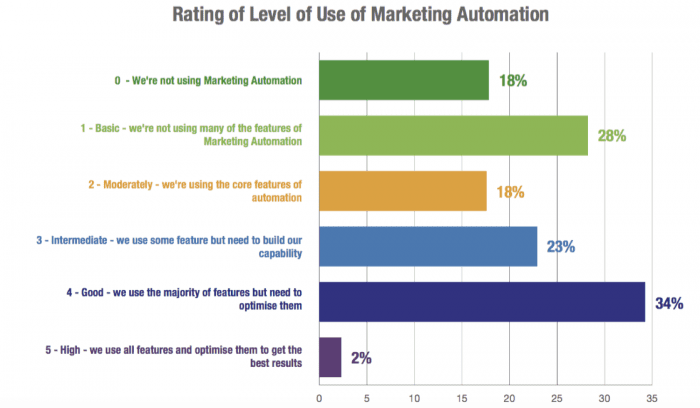 Dave Chaffey of Smart Insights will be speaking at B2B Marketing Automation Expo 2017 where he will cover some of the best ways to get started with Automation. Speaking at last year's show - he covered key techniques to consider to get started or go to the next level :
Dave Chaffey of Smart Insights will be speaking at B2B Marketing Automation Expo 2017 where he will cover some of the best ways to get started with Automation. Speaking at last year's show - he covered key techniques to consider to get started or go to the next level :
- A multi-step welcome sequence which can be made more relevant with dynamic content - a more advanced technique
- Lead scoring and lead grading so that rules can be put in place to send more relevant emails or outbound calls when prospects are qualified
- Use of re-marketing on third-party sites to nurture prospects who have shown interest in a product or service
2. Content marketing
Content marketing is a technique that has been used in B2B marketing for many years, but in recent years, the popularity of inbound marketing has given more attention to share blogs and social media. Over the past three or four years, readers have voted for the importance of Content Marketing amongst the marketing activities available. Within content and inbound marketing, I think the ongoing discussions will be around getting the right balance of content quantity, frequency and quality and of course, measuring the ROI of Content Marketing. This article around research from Buzzsumo gives an interesting summary explaining that Content Marketing's Future Depends on Shorter Content and Less Content. I agree with the less content part, although not necessarily the shorter content part as research shows that longer content can be more effective in business-to-business blog posts.
Content marketing is a great tactic for B2B marketers because the long customer journey means customers will want to do plenty of research before purchasing and compare several different providers.
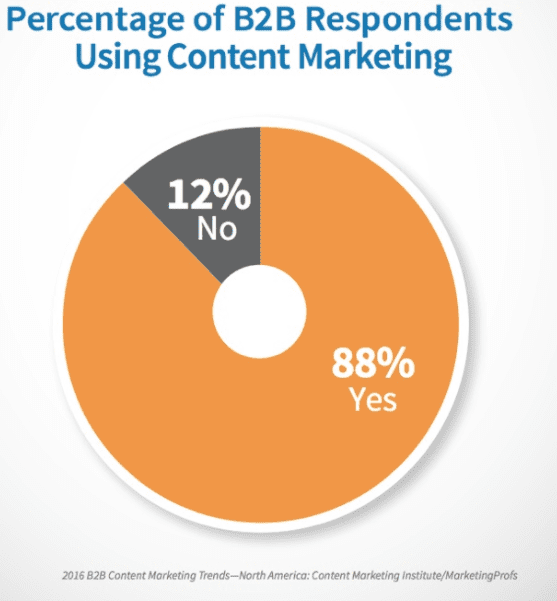
3. Web personalisation
Website personalisation is a well-established technique for Ecommerce sites but traditionally has been less widely used within business-to-business. It's surprising since personalisation of emails using techniques such as dynamic content insertion as described above is popular.
There are now SaaS products such as BrightInfo and Evergage which make web personalisation services more affordable for smaller companies. These may also include automation features to recommend the most relevant piece of content within the nurture path.
4. Channel integration
With so many separate digital marketing channels there is a tendency to focus on individual channels, but an integrated nurturing process can reap dividends. One key trend here is the integration of different channels.
Another data point on this trend is this research on the top channels for generating B2B leads by Ascend which is a sense check that B2B marketers aren't chasing the latest fads whilst not spending the lion's share of their time on the channels delivering the vast majority of their leads or sales.
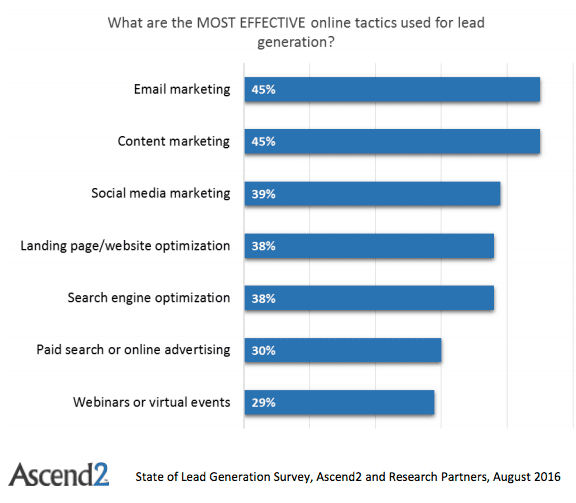
Another benefit of marketing automation is that it enables businesses to join up the customer journey between the website and emails, not only with email sequences when someone registers, but also through closing the loop and identifying when a prospect downloads content in future, so showing their interest or 'digital body language' and further follow-up.
Another form of integration in nurturing is through re-targeting or re-marketing in Google AdWords where ads can be served to previous site visitors on Google's display network. This option has been available for many years, but the trend is that new options are available with social media. Within B2B, LinkedIn is important and there are now new options to target within the LinkedIn programmatic service. Facebook and Twitter have also extended their retargeting options this year as part of this trend.
5. Account-Based Marketing
Account-Based Marketing or ABM is an established approach in B2B marketing, particularly within larger organisations who have structures and processes to target key accounts.
ITSMA which first pioneered ABM more than 10 years ago, defines it as “more than a sales or marketing approach; it is a collaborative strategy that engages sales, marketing, subject matter experts and delivery professionals, as well as key executives
in the chosen client account to determine where and how to best meet the client’s unique business challenges. With deep insight into the client’s business and key goals, this collaborative team creates a well-orchestrated marketing and sales campaign for a single account.”
Previously, ABM was a tactic or mindset which was poorly supported by most Marketing Automation services which focus on individual customer records. The trend is for automation services to include ABM features which make it easier to nurture groups of people automatically through email and re-targeting.
6. Mobile marketing
It goes without saying that the shift to mobile is a key trend for B2B marketers, as it has been for several years now. We've included this for completeness since Google tells us that most businesses have a responsive site, so you could say it's no longer a trend. However, changes that will affect B2B marketers in 2017 (particularly those who don't know about them) including Google's new mobile-first index and potential penalties for pop-ups.
Mobile now accounts for over half of web traffic, and where previously B2B companies could assume that their customers would be researching them on desktop devices, now a new breed of business owner using mobile devices to research solutions on the go means B2B marketers need to be sure that their content is mobile optimised to ensure a smooth processes for users on all devices.
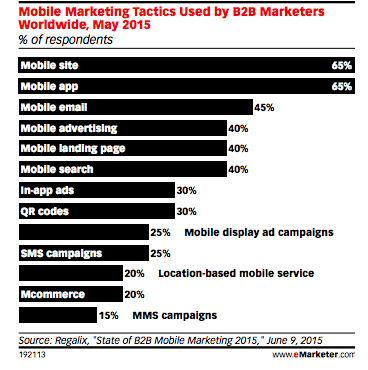
Over half of B2B businesses have mobile sites and mobile apps, which shows the industry is finally starting to get is act together on mobile. For some industries, having a mobile app won't be necessary, but really all should have mobile responsive sites. Even if none of your customers are arriving on mobile devices (which some certainly will), you still need a responsive site because of Google's 'mobilegeddon' update, as otherwise you'll be getting penalised. B2B buyers are increasingly using mobile devices, as you can see from the charts below, so a mobile optimised site is an absolute necessity.
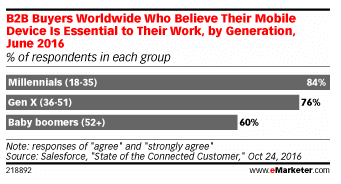
7. Social media
This research shows that B2B businesses tend to get the best results from LinkedIn and Twitter, but are present across a wide range of social networks. Youtube and Slideshare also stand out as particularly effective, whilst Google+ is very ineffective considering the majority of B2B businesses are using it. The eMarketer chart shows 2015 data, whilst the chart underneath it shows data for 2016.
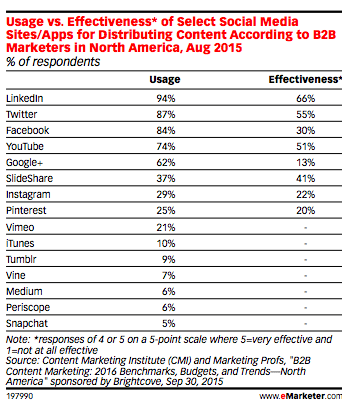
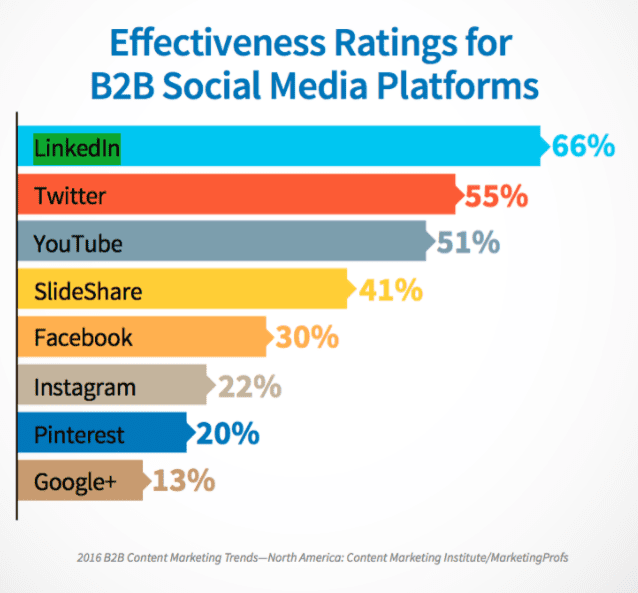
With B2B social media, it's often important to prioritise, as whilst it is easy to set up an account on a new social network, it requires plenty of effort to run it effectively. Focusing only on the most effective networks is usually the best tactic.
So, these are our seven trends and some practical ideas of techniques within them. Do let us know of other digital marketing tactics that you think will be effective in the year ahead.
Of course, all of these tactics will need prioritising as part of a strategy - see our B2B Marketing Strategy planning infographic for the 7 Steps we recommend.














